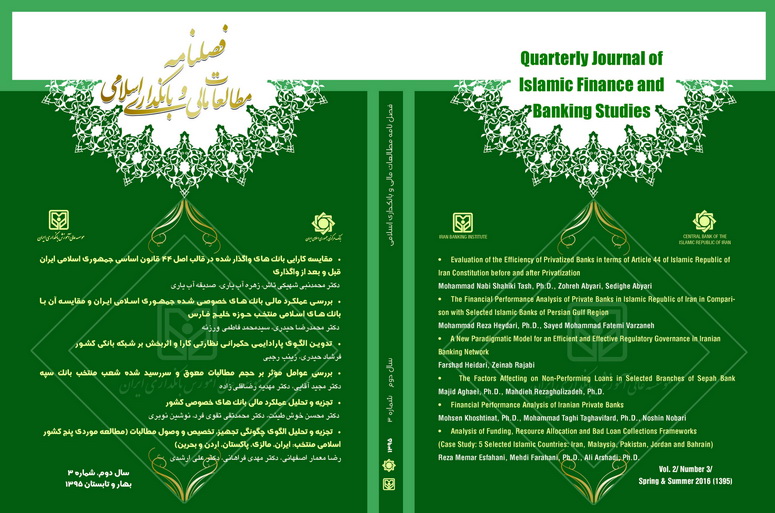
IBI has been offering various short term programs for management and personnel of the banks in various levels in recent years with a view to enhancing the trainees capabilities. In these programs IBI, through its competent teachers, and also by utilizing the vast banking network, transfers know-how and experience of the banking network, both local and worldwide, to participant Short-Term Training’ courses students. Such programs have had significant impact on the productivity of the banking personnel and on the performance of banks in general.

Following is a list of short term courses offered at IBI:
|
No |
Titles |
|
1 |
Financial Appraisal of Investment Projects |
|
2 |
Excel for bank’s officers |
|
3 |
Islamic Financial Instruments |
|
4 |
Legal Aspects of Financing International Projects |
|
5 |
Islamic Code of Conduct |
|
6 |
Professional Code of Conduct and Human Relations |
|
7 |
Organizational Behavior and Code of Conduct |
|
8 |
Value at Risk |
|
9 |
Time Value of Money and its Application in Banking |
|
10 |
Financial Appraisal of Small Projects |
|
11 |
Principles of Banking Accounting |
|
12 |
Accounting Principles (2) |
|
13 |
Safety Principles and Regulations |
|
14 |
Credit underwriting |
|
15 |
Letters of Credit |
|
16 |
Local Letters of Credit and Fraud |
|
17 |
Econometrics |
|
18 |
Effective Communication Models in Banking |
|
19 |
Forex(1) |
|
20 |
Forex(2) |
|
21 |
Tellers’ Issues |
|
22 |
Debt Securities Underwriting |
|
23 |
INCOTERMS 2010 |
|
24 |
Introduction to Forex |
|
25 |
Introduction to Stocks |
|
26 |
Introduction to Banking |
|
No |
Titles |
|
27 |
Introduction to the Islamic Banking |
|
28 |
Introduction to Stock Exchange |
|
29 |
Introduction to Bank Guarantees |
|
30 |
Introduction to Cheques and its Legal Aspects |
|
31 |
Introduction to banking System |
|
32 |
Introduction to E-payment Systems (1) |
|
33 |
Introduction to E-payment Systems (2) |
|
34 |
Introduction to Money and Banking Law |
|
35 |
Introduction to Administrative Laws and Regulations |
|
36 |
Introduction to Credit Cards |
|
37 |
Introduction to Money and Banking |
|
38 |
Introduction to Banking Law and Commercial Law |
|
39 |
Introduction to Banking System and Money and Banking Law |
|
40 |
Introduction to Financial Instruments and Institutions for Managers |
|
41 |
Accounting and Financial Reporting for Banks |
|
42 |
Internal Audit for Banks |
|
43 |
Banking Law (1) |
|
44 |
Banking Law (2) |
|
45 |
E- banking Law |
|
46 |
Commercial Law |
|
47 |
International Trade Law with Emphasis on Banks |
|
48 |
Financial Law Procedure |
|
49 |
Local Letters of Credit Procedures |
|
50 |
Comparative Successful Strategies of Marketing of Banking Services |
|
51 |
Credit Rating |
|
52 |
Credit Rating and its Role in Credit Policies |
|
No |
Titles |
|
53 |
Organizational Behavior and Effective Communication |
|
54 |
Management Principles and Supervision |
|
55 |
Operational Risk Management for Banks |
|
56 |
English for Foreign Bank’s Personnel |
|
57 |
Investment and Calculation of Commission |
|
58 |
Cash Flow Statements |
|
59 |
Forex Letters of Guarantee |
|
60 |
Rials Letters of Guarantee |
|
61 |
Finance |
|
62 |
Decision Making |
|
63 |
Speech Techniques |
|
64 |
Effective Decision Making Techniques for Managers |
|
65 |
Oral Skills |
|
66 |
Telephonic Negotiation Skills |
|
67 |
Applied Excel for Banking Mathematics |
|
68 |
Introduction to Securities Markets |
|
69 |
English for Foreign Branches’ Personnel |
|
70 |
Oral Skills |
|
71 |
Comfar III |
|
72 |
Financial Management |
|
73 |
Human Resources Management |
|
74 |
Treasury and Liquidity Management |
|
75 |
Stress Management |
|
76 |
Basel II Accord |
|
77 |
Customer Based Banking |
|
78 |
Nonperforming Loans |
|
No |
Titles |
|
79 |
Calculating Loan Payments with Excel |
|
80 |
Comparative Islamic Banking and Conventional Banking |
|
81 |
Time Management |
|
82 |
Managing Banking Risks |
|
83 |
Principles of Market Risk |
|
84 |
Economic Appraisal of Projects |
|
85 |
Economic Market Strategies and Value Generation for Customers |
|
86 |
Stress and Ways to Deal with it |
|
87 |
Ethics and Professional Conduct Standard in the Bank |
|
88 |
Principles of Banking |
|
89 |
Public Relations Principles |
|
90 |
600USP |
|
91 |
Principles of Risk and Insurance |
|
92 |
Management Principles |
|
93 |
Accounting Principles (1) |
|
94 |
Introduction to Derivative Instruments and their Valuation |
|
95 |
Writing Skills |
|
96 |
Financial Markets |
|
97 |
Marketing Banking Services |
|
98 |
Marketing and Value Creation for Customers |
|
99 |
Basel II and Credit Risk Management |
|
100 |
Private Banking |
|
101 |
Islamic Banking and its Legal and Jurisprudential Foundations |
|
102 |
Credit Administrative |
|
103 |
E-banking |
|
104 |
Applied International Banking |
|
No |
Titles |
|
105 |
International Banking(1) |
|
106 |
International Banking(2) |
|
107 |
Domestic Banking(1) |
|
108 |
Domestic Banking(2) |
|
109 |
Modern Banking |
|
110 |
Investment Banking |
|
111 |
Corporate Banking |
|
112 |
E-commerce |
|
113 |
Financial Statements Analysis (Advanced) |
|
114 |
Financial Statement Analysis (Intermediate) |
|
115 |
Financial Statements Analysis (Elementary) |
|
116 |
Fraud in International Payments |
|
117 |
Writing Skills |
|
118 |
Credit Administration |
|
119 |
Debt Securities Underwriting |
|
120 |
Fraud in Letters of Credit |
|
121 |
Forex Accounting (2) |
|
122 |
Forex Accounting (1) |
|
123 |
Local Letters of Credit Accounting |
|
124 |
Banking Accounting (1) |
|
125 |
Banking Accounting(2) |
|
126 |
Banking Contracts Accounting |
|
127 |
Capital Adequacy |
|
128 |
General Law |
|
129 |
Outline of Fundamental Change of Banking System Project |
|
130 |
General Economics |
|
No |
Titles |
|
131 |
Internal Control and Inspection |
|
132 |
Internal Control in Banking System |
|
133 |
Application of Data Mining in Banking |
|
134 |
Reengineering of Processes |
|
135 |
Liquidity Risk and its Management in Banks |
|
136 |
Money Laundering |
|
137 |
Principles of International Banking |
|
138 |
Principles of Organization and Management |
|
139 |
Directives(1) |
|
140 |
Directives(2) |
|
141 |
Modeling Operational Risk a Bayesian Approach |
|
142 |
Banks Business Plan and its Drafting |
|
143 |
Customer Relations Management |
|
144 |
Strategic Management |
|
145 |
Branches Affairs Management |
|
146 |
Productivity Management |
|
147 |
Portfolio Management and Risk Analysis |
|
148 |
Change Management |
|
149 |
Balance Sheet Management |
|
150 |
Risk Management |
|
151 |
Credit Risk Management |
|
152 |
Administrative Correspondence |
|
153 |
English Banking and Commercial Correspondence |
|
154 |
Farsi Banking and Commercial Correspondence |
|
155 |
Applied Excel for Banking Mathematics |
|
156 |
Contract Drafting |
|
No |
Titles |
|
157 |
Collection Procedures for Past Due Accounts |
|
158 |
Branches Operational Software |
|
159 |
Theory of Risk in Money and Financial Markets |
|
160 |
An Overview of Branches Activities |
|
161 |
Emotional Intelligence and Stress Management |
|
162 |
Characteristics of Private Banks |
|
163 |
Risk Management for Branch Managers |
|
164 |
Liquidity Risk Management in Islamic Banking |
In the academic year, starting on September 2013 a total of 197,135 man-hours of such short-term trainings have been offered to the banks and credit institutions by IBI. Future plans of IBI include collaboration with interna-tional institutes involved in banking education leading to professional degrees, holding joint seminars and ed- ucational tours.






